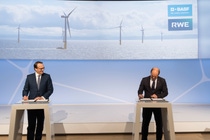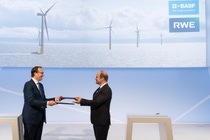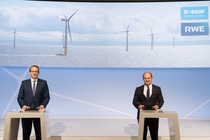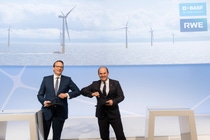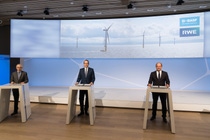Media
Joint News Release
BASF and RWE plan to cooperate on new technologies for climate protection
- Green electricity and innovative production technologies could make the Ludwigshafen chemical site a lighthouse for climate protection in the chemical industry
- Additional offshore wind farm with a capacity of 2 GW would provide BASF with green electricity for CO2-free production processes from 2030
- Letter of intent focuses on climate-neutral chemical industry and CO2-free hydrogen
Today in Ludwigshafen, Germany, Dr. Martin Brudermüller (BASF) and Dr. Markus Krebber (RWE), accompanied by Chairman of the Mining, Chemical and Energy Industries Union (IG BCE) Michael Vassiliadis, presented a project idea that shows how industrial production can become sustainable and future-proof. The project envisions an additional offshore wind farm with a capacity of 2 gigawatts (GW) to provide the Ludwigshafen chemical site with green electricity and enable CO2-free production of hydrogen. The aim is to electrify the production processes for basic chemicals, which are currently based on fossil fuels.
This will involve utilizing CO2-free technologies such as electrically heated steam cracker furnaces to produce petrochemicals. BASF is already working with partners on developing these technologies. To advance the joint project, the CEOs of BASF and RWE have signed a letter of intent covering a wide-ranging cooperation for the creation of additional capacities for renewable electricity and the use of innovative technologies for climate protection.
“Together we want to accelerate the transition to a CO2-neutral chemical industry through electrification and through the use of CO2-free hydrogen,” said Brudermüller and Krebber. Michael Vassiliadis, Chairman of the Mining, Chemical and Energy Industries Union (IG BCE), commented: “Here, two strong partners are making climate-friendly transformation and energy transition tangible and concrete. We stand behind this major project because it can be a symbol for the innovative power of industry and its employees. In many places, they are working with great passion and expertise to shape the transformation. They deserve all the support they can get.”
These plans could result in the avoidance of around 3.8 million metric tons of CO2 emissions per year, of which 2.8 million tons would be realized directly at BASF in Ludwigshafen. It shows very clearly how climate protection and competitiveness can be harmonized in the chemical industry. No public subsidies would be needed for the construction of the wind farm.
Martin Brudermüller, Chairman of the Board of Executive Directors of BASF SE, stressed: “Without the availability of sufficient volumes of electricity from renewable sources at competitive prices, our future transformation will not be possible! This task is only achievable with innovative and intensive cooperation between politics and industry. And it requires collaboration across the value chains. In our partnership between RWE as a leading company in power generation and BASF in chemicals, we bring together the necessary prerequisites and the will to shape things.”
Markus Krebber, CEO of RWE, added: “Coupling a new offshore wind farm already in the planning stage to an industrial customer such as BASF, who will convert its production to green electricity and hydrogen on this basis, would be a first for Germany. The realization of our proposal would represent a true acceleration of the expansion of renewable energies. Of course, there are still some open questions, but we want to push this forward – the faster, the better. This is how we will shape the energy transition.”
Realizing this plan will require a suitable regulatory framework. Policymakers have said they plan to significantly increase the expansion targets for renewable energies and accelerate capacity additions. For this to succeed, there will need to be a tendering process for offshore project sites where the current plans only foresee use after 2030. The companies instigate that these sites should be specifically designated for tenders focused on industrial transformation processes. Another important factor: Green electricity should not be subject to EEG levy. In addition, there is currently no regulatory framework for CO2-free hydrogen production.
With the project presented today, BASF and RWE show how a cleverly planned transformation of Germany’s industrial sector can succeed. “We are convinced: Climate-neutral industrial production ‘made in Germany’ ensures that value added and employment remain in Germany and opens up export opportunities for new technologies,” said Brudermüller and Krebber.
Note to editors: Additional documentation on the project such as CEO statements, videos and graphics can be found here: https://www.basf.com/global/en/media/events/2021/press-conference-strategic-partnership-climate-protection.html
About BASF
At BASF, we create chemistry for a sustainable future. We combine economic success with environmental protection and social responsibility. More than 110,000 employees in the BASF Group contribute to the success of our customers in nearly all sectors and almost every country in the world. Our portfolio is organized into six segments: Chemicals, Materials, Industrial Solutions, Surface Technologies, Nutrition & Care and Agricultural Solutions. BASF generated sales of €59 billion in 2020. BASF shares are traded on the stock exchange in Frankfurt (BAS) and as American Depositary Receipts (BASFY) in the U.S. Further information at www.basf.com.
RWE AG
RWE is one of the world’s leading renewable energy companies. It has capacity of around 11 gigawatts based on renewable energy, including hydropower and biomass as well as a highly efficient gas fleet and an international energy trading business. RWE wants to expand this position by investing in onshore and offshore windpower, photvoltaics and storage technologies. As a driver of the energy transition, the company also focusses on innovative projects such as floating offshore as well as the generation and use of hydrogen. At the same time, RWE is responsibly phasing out nuclear energy and coal. Government-mandated phaseout roadmaps have been defined for both of these energy sources. The company has a total of around 41 gigawatts of generating capacity in its portfolio and employs around 20,000 people worldwide. RWE has a clear ambition: to be carbon-neutral by 2040. On its way there, the company has set itself ambitious targets for all activities that cause greenhouse gas emissions. The reknowned Science Based Targets initiative has scientifically confirmed that these emission reduction targets are in line with the Paris Agreement.
DSGVO
RWE would like to continue informing you of current affairs at RWE via press releases after the introduction of the German General Data Privacy regulation and contact you for this purpose. We hereby inform you that our data privacy policy has changed. Personal data which we collect, store and process for mailing purposes shall not be passed on to third parties. You have provided your personal data on a voluntary basis. You have the right to forbid the use of this data at any time. You have the right to obtain information on your stored personal data from us and to object to the processing and use of said data at any time. Should you not be interested in continuing to receive press releases from us, please let us know by sending an e-mail to datenschutz-kommunikation@rwe.com. We shall then delete your data from our system and you shall no longer receive any press releases from us. Please direct inquiries regarding our data privacy policy to datenschutz@rwe.com.
Media contacts:
|
BASF Corporate Media Relations Thomas Nonnast Phone: +49 173 3798627 E-Mail: thomas.nonnast@basf.com |
RWE AG Media Relations Matthias Beigel Phone: +49 152 54535507 E-Mail: matthias.beigel@rwe.com
|
P-21-217
.

